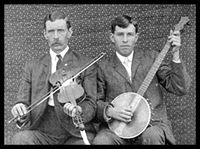Annotation:Over the Waterfall: Difference between revisions
No edit summary |
No edit summary |
||
| Line 2: | Line 2: | ||
---- | ---- | ||
<p><font face="garamond, serif" size="4"> | <p><font face="garamond, serif" size="4"> | ||
'''OVER THE WATERFALL'''. AKA and see "[[Fellow that Looks Like Me (The)]]," "[[Punkin Head]]." Old-Time, Breakdown. USA, Virginia. D Major. Standard tuning (fiddle). AB (Silberberg): AABB (most versions). "Over the Waterfall" is sourced to fiddler Henry Reed of Glen Lyn, Virginia, and was learned from directly from Reed and popularized by folklorist and fiddler Alan Jabbour. Reed himself may have learned it from hearing it emanating from a steam-driven calliope. "Over the Waterfall" is a melody that is fairly wide-spread throughout the British Isles and North America, explains Jabbour, and was used both for a well-known British-American song sometimes called "[[Eggs and Marrowbones]]" (AKA "[[Old Woman from Wexford]]," "[[Old Woman in Dover]]," "[[Wily Auld Carle]]" etc.) and as an instrumental tune. Comparison with "[[Dark Girl Dressed in Blue (2) (The)]]" in O'Neill's '''Music of Ireland''' (1903) reveals a striking similarity between them, and it is possible "Over the Waterfall" was adapted from an Irish source. Others have suggested that it may originally have been a composed piece from the turn of the century that was disseminated via traveling-circus and riverboat musicians. | '''OVER THE WATERFALL'''. AKA and see "[[Fellow that Looks Like Me (The)]]," "[[Punkin Head]]." Old-Time, Breakdown. USA, Virginia. D Major. Standard tuning (fiddle). AB (Silberberg): AABB (most versions). "Over the Waterfall" is sourced to fiddler Henry Reed (1884-1968) of Glen Lyn, Virginia, and was learned from directly from Reed and popularized by folklorist and fiddler Alan Jabbour. | ||
[[File:reed.jpg|200px|thumb|left|Henry Reed]] | |||
Reed himself may have learned it from hearing it emanating from a steam-driven calliope. "Over the Waterfall" is a melody that is fairly wide-spread throughout the British Isles and North America, explains Jabbour, and was used both for a well-known British-American song sometimes called "[[Eggs and Marrowbones]]" (AKA "[[Old Woman from Wexford]]," "[[Old Woman in Dover]]," "[[Wily Auld Carle]]" etc.) and as an instrumental tune. Comparison with "[[Dark Girl Dressed in Blue (2) (The)]]" in O'Neill's '''Music of Ireland''' (1903) reveals a striking similarity between them, and it is possible "Over the Waterfall" was adapted from an Irish source. Others have suggested that it may originally have been a composed piece from the turn of the century that was disseminated via traveling-circus and riverboat musicians. | |||
<br> | <br> | ||
<br> | <br> | ||
Revision as of 04:12, 20 March 2015
Back to Over the Waterfall
OVER THE WATERFALL. AKA and see "Fellow that Looks Like Me (The)," "Punkin Head." Old-Time, Breakdown. USA, Virginia. D Major. Standard tuning (fiddle). AB (Silberberg): AABB (most versions). "Over the Waterfall" is sourced to fiddler Henry Reed (1884-1968) of Glen Lyn, Virginia, and was learned from directly from Reed and popularized by folklorist and fiddler Alan Jabbour.

Reed himself may have learned it from hearing it emanating from a steam-driven calliope. "Over the Waterfall" is a melody that is fairly wide-spread throughout the British Isles and North America, explains Jabbour, and was used both for a well-known British-American song sometimes called "Eggs and Marrowbones" (AKA "Old Woman from Wexford," "Old Woman in Dover," "Wily Auld Carle" etc.) and as an instrumental tune. Comparison with "Dark Girl Dressed in Blue (2) (The)" in O'Neill's Music of Ireland (1903) reveals a striking similarity between them, and it is possible "Over the Waterfall" was adapted from an Irish source. Others have suggested that it may originally have been a composed piece from the turn of the century that was disseminated via traveling-circus and riverboat musicians.
The earliest sound recording was in the very last years of the 1920's by Al Hopkins and His Bucklebusters, who recorded it on a 78 RPM as "The Fellow that Looks Like Me" (Brunswick 184). "The Fellow that Looks Like Me" was in the repertoire of Virginia fiddler Stuart Lundy (son of Galax fiddler Emmett Lundy) under that title, as well as the aforementioned Bucklebusters. Lundy died in the late 1970's. The Hopkins family (Al is referenced above) was also originally from Galax, suggesting the tune was in the repertory of musicians in the region. The Reed version of "Over the Waterfall" has become very common among old-time fiddlers (indeed, it has become hackneyed), and is now usually regarded as a beginner's tune. Kentucky fiddler J.P. Fraley played the tune, learned from the fiddling of his father; a somewhat more melodically complicated version.
Source for notated version: Fennigs All Stars (N.Y.) [Brody].
Printed sources: Brody (Fiddler's Fakebook), 1983; p. 211. Phillips (Traditional American Fiddle Tunes, vol. 1), 1994; p. 177. Silberberg (Tunes I Learned at Tractor Tavern), 2002; p. 114. Sing Out, 198-; p. 76. Welling (Welling's Hartford Tunebook), 1976; p. 4.
Recorded sources: CCF2, Cape Cod Fiddlers - "Concert Collection II" (1999). Document 8041, Al Hopkins and His Bucklebusters (reissue). Front Hall 01, Fennigs All Stars- "The Hammered Dulcimer." Kicking Mule 202, John Burke- "Fancy Pickin' and Plain Singing." Rounder 0122, Norman Blake- "Rising Fawn String Ensemble."
See also listing at:
Jane Keefer's Folk Music Index: An Index to Recorded Sources [1]
Hear Alan Jabbour's 1967 field recording of Henry Reed playing the tune at American Memory [2]
